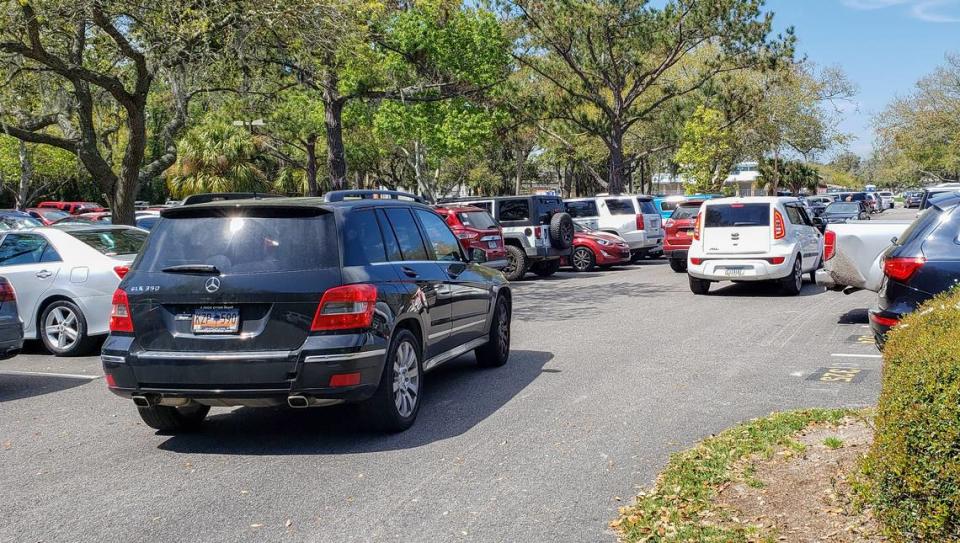Hilton Head is trying to Band-Aid its beach parking problem. Here’s the latest proposal
Cars lap — one time, two times, three times — around the Hilton Head Piggy Wiggly parking lot. It’s the weekend and owner David Martin stands outside, watching people scour for a spot. Once they park, they don’t pull out shopping bags and grocery lists. Instead, out come umbrellas and folding chairs. They’re beach goers, not shoppers, and they walk past the store, past the packed Coligny Beach Park lot and across the street to the ocean.
Martin, who has lived on the island for decades, compared beach parking on Hilton Head to the Wild West. More than 3.1 million people visit the town throughout the year and there are about 37,660 full-time residents. Where those people leave their cars when they go to the beach has become an issue. Busy parking lots during tourist season, or events, harm businesses by taking away parking for customers in their private lots, frustrate those who can’t find a spot, and can be unsafe for vehicles and pedestrians.
For decades, Martin said he can remember Hilton Head trying to wrangle the issue. Currently, the town is hung up discussing how to implement an electronic parking program that’s been in the work for at least four years, according to Deputy Town Manager Josh Gruber.
The most recent proposal, presented to the Community Services and Public Safety Committee by town staff in April, includes implementing paid parking at two beaches (not Coligny) that were previously free, increasing fees to $5 per hour and gating some beaches. The proposal wouldn’t privatize the beaches, which are public under South Carolina’s Public Trust Doctrine, but it would put up barriers to entry.
It’s an attempt by the town to mitigate a larger issue: its beach parking lots don’t have enough capacity. There are 1,155 beach visitor parking spots on Hilton Head for its estimated 8,500 visitors per day, not including including second-home owners or workers. Not every visitor is going to the beach, or driving a car, but the numbers point towards a parking supply shortage.
“This demand far exceeds the supply. In some way we have to reduce demand until we can increase supply,” Council member Steve Alfred said. Previously, the town has discussed a multi-level parking garage — which about 60% of residents, business owners and visitors disapproved of in a 2020 town survey — or offsite parking with shuttle transportation. “But that’s not going to happen this year or next year,” Alfred said. “So we have to deal with the situation for now.”
In addition to trying to alleviate stress on the island’s short supply of spaces, fees would fund the electronic program. Gruber said the plan would allow visitors to track which lots are full and the town to enforce parking more efficiently, reducing traffic. Contracted employees monitor the lots on a rotating basis, except for Islanders Beach Park, which is manned and is mostly permit parking for residents.
The increased and expanded fees for visitor-paid parking would allow this current $15 resident parking pass to be free. The town estimates visitor-paid parking could bring in up to $1.7 million each year, depending on whether the town charges for it year-round or seasonally.

Payment would be enforced by cameras at each lot, which have been installed at each location except for Alder Lane. The cameras will be fully functional within a couple of weeks, according to the town’s report at the committee meeting.

Just because the cameras are functional doesn’t mean the town is ready to implement the program.
The committee must still approve the resolution to put in front of the town council, who must then vote to approve the program, including fee structures, enforcement and the timeline. In the April committee meeting, a vote to approve the resolution failed. If it the resolution moves on in the May meeting, the town council must weigh the problems that paid parking might solve with the problems it might create.
One potential problem: visitors spending money on parking instead of on local business.
“Every dollar for parking is a dollar not spent in our local economy,” Lee Lucier said at the meeting. He is a local business owner and the COO of the Richardson Group real estate development and management company.
Another concern is that free parking at Coligny Beach will incentivize visitors to park there instead of at the paid lots, further exacerbating parking problems for surrounding businesses.

“We’re concerned by employee parking being taken by tourists, day trippers, or residents who are parking in our neighborhoods and our businesses,” Lucier said. “Then our employees are put out in the street.”
At Piggy Wiggly, Martin said that when shifts change at 2 p.m., cashiers are circling with the beach goers looking for a spot.
“I’m out in the parking lot as we speak,” Martin said. “Not one spot,” he said of the 92 parking spaces, despite only 21 people being inside the store.
Here is what the town proposed at its April meeting:
What beaches would require parking?
Currently, there is paid parking at the following beaches ranging anywhere from 50 cents an hour to $1 an hour:
Alder Lane Beach
Driessen Beach
Folly Field Beach
Islanders Beach
Hilton Head staff are proposing paid parking at $5 per hour with a cap of $30 a day at:
Alder Lane Beach
Driessen Beach
Folly Field Beach
Islanders Beach
Fish Hall Beach
Chaplin Park (excluding the Youth Recreational Season, charging essentially between Memorial Day to Labor Day, according to Gruber).
The staff is proposing free parking at:
Coligny Beach Park
What parks will be gated?
“A couple of them will remain without gates, a couple of them will have gates,” Gruber said of the beach parking, though he didn’t say which. The lots with gates will be restricted to 6 a.m. to 10 p.m.
The gates would allow visitors to leave, but not park, after 10 p.m.
“It’s not so much to keep people out early in the morning, but it’s to keep people out late at night,” he said.
Would it be year-round?
The town presented both a year-round option and a seasonal option, which would charge during June, July and August.
It estimated the year-round option would bring in about $1.7 million each year and the seasonal option would bring in about $1.4 million each year.
“We can pick and choose locations, times and rates,” Gruber said.
He said: “This is a hypothetical example of one (option) we could implement that would hopefully have less of an impact than it would be to charge all year long,” of the seasonal option.
Who would have to pay?
Town staff proposed that the current $15 fee for Island Resident Beach Parking Passes be made free and that revenue replaced by revenue generated exclusively from beach parking fees.
Currently, Hilton Head Island residents get two passes per year that would allow them to park in any of the metered spaces year round.
“The program is targeted at visitors and guests who are not otherwise contributing from a property tax standpoint towards paying for these cost of operations,” Gruber said at the meetings.
How would payment work?
The days of parking at Driessen Beach with crossed fingers that the parking machine isn’t working are over. Cheating the town out of a few bucks an hour could get much harder.
As cars enter a lot, cameras capture their license plate and immediately recognize whether the car is a resident’s or not. If the car isn’t a resident’s, the system will know the driver needs to pay.
Once parked, the driver can pay by via text message or a QR code. The town plans to place signs with a phone number in each lot. If the driver doesn’t pay, then the town will be notified that someone needs to be ticketed in that lot.
This tracking would also allow the town to monitor the number of people in each lot and eventually notify potential visitors through an app or notifications when lots are full, with the goal to reduce traffic and air pollution.
What’s the timeline?
With the report still in the Community Services and Public Safety Committee, the electronic parking fees and changes couldn’t be voted on and implemented by town council until at least after the 2024 summer season, potentially jeopardizing current beach patrol services.
Gruber warned that if they don’t pass the fees soon, they’ll have to reevaluate the budget, which factors in the revenue from paid parking.
“If we’re not going to charge for parking to pay for it, it certainly can’t be sustained at the level that is is now,” Gruber said.
The town has $869,730 in projected expenses for the 2024 fiscal year for parking management, and $623,788 for the 2025 fiscal year. The town contracts a Michigan-based parking services firm called PCI Municipal Services to provide the services and technology for the parking management program.
“If this vote stands, it creates an issue with being able to provide services at Islander Beach Park,” said Council member Tamara Becker, shaking her head when Council members Alex Brown and Patsy Brison voted against the moving the resolution to the town council. Council member Steve Alfred voted to move it forward.
For Brown and Brison, they said they need more data and specifics.
“I need to understand on a five, ten, year term where we’re going to be implementing this project,” Brown said, questioning what the town will do with the at least $1.4 million it estimates to bring in with the program, after paying expenses. “We owe the community an answer to that if we’re going to start to charge for parking on Hilton Head.”

